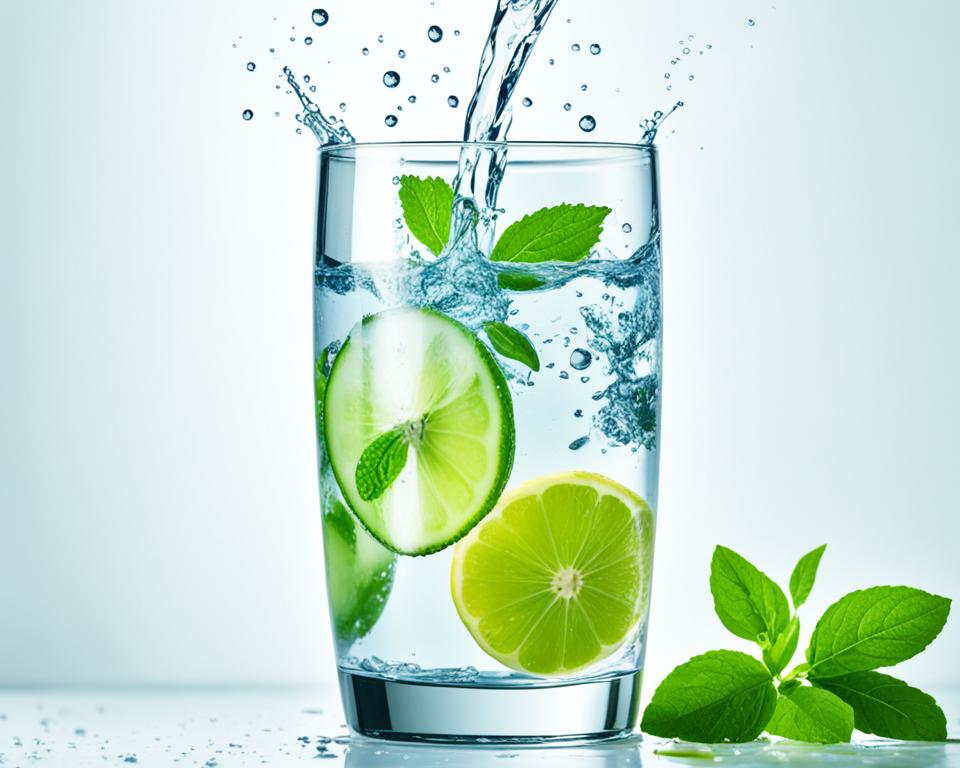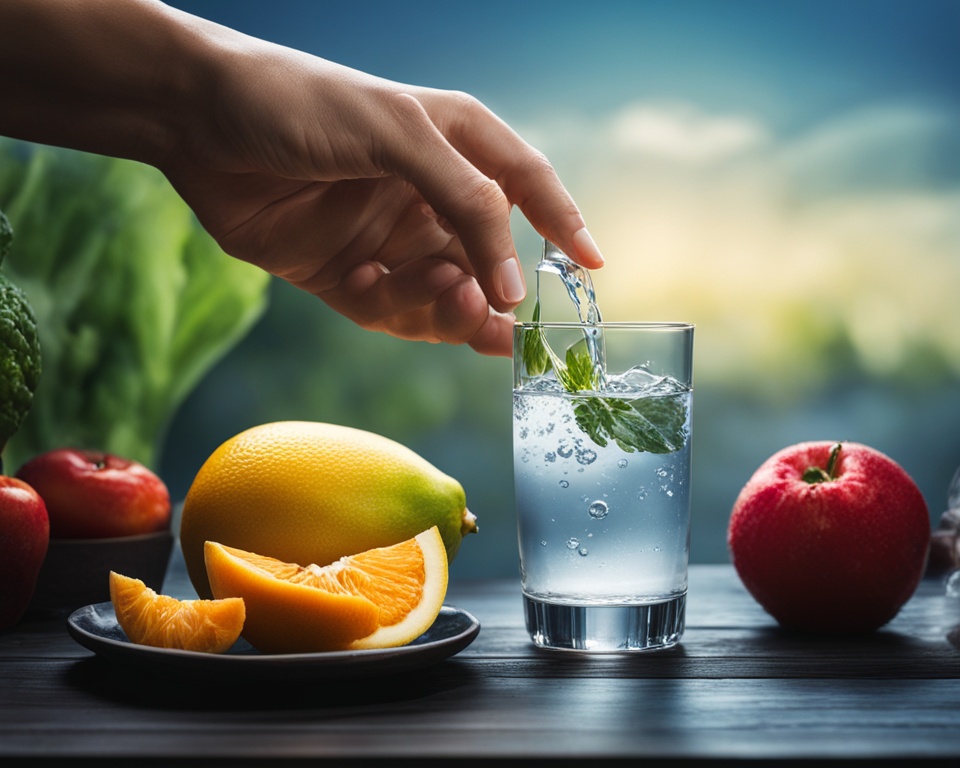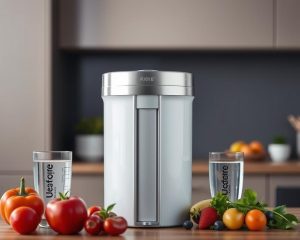
Drinking the right liquids is key to staying healthy. In this guide, we’ll look at different types of drinking water. We’ll show you the best choices for your health. You’ll learn about the importance of staying hydrated and the benefits of mineral-rich and alkaline waters.
Staying hydrated helps your body work right. It keeps your body at the right temperature and helps you absorb nutrients. We’ll talk about how water helps your health and the dangers of not drinking enough. You’ll learn about the good and bad of different water sources like tap, bottled, and spring water.
Let’s dive into the world of drinking water together. We’ll find out how to stay hydrated and what water is best for your health. Whether you want more energy, a stronger immune system, or just to feel good, this guide has the info you need.
Importance of Drinking Water for Overall Health
Drinking enough water is key to staying healthy. Water helps with many body functions, making it a must-have for a healthy life. Knowing how important water is helps people make sure they drink enough each day.
Water’s Role in Bodily Functions
Water keeps the body’s temperature right, moves nutrients around, and helps with many metabolic processes. It also makes joints move smoothly, helps with digestion, and supports the kidneys and liver. Not drinking enough water can harm the body’s systems, leading to health problems.
Consequences of Dehydration
- Fatigue and decreased energy levels
- Headaches and migraines
- Decreased cognitive function and mental clarity
- Dry skin and increased risk of skin conditions
- Constipation and digestive problems
Long-term dehydration can lead to serious issues like kidney stones, urinary tract infections, and heat-related illnesses. Drinking enough water helps keep the body working right and prevents problems from tap water contaminants.
“Proper hydration is not just a luxury, but a necessity for overall health and well-being.”
Types of Drinking Water: Pros and Cons
Choosing the right drinking water can seem hard with so many options. From tap water to bottled, spring to distilled, each type has its own pros and cons. Let’s look at the main types of drinking water to help you decide.
Tap Water
Tap water is easy to get and not too expensive. But, it can have contaminants based on where you live. To be safe, you might want to use extra filters to get rid of things like lead, chlorine, and fluoride.
Bottled Water
Bottled water is handy and might seem cleaner, but it’s not always better than tap water. Some bottled waters are just purified tap water. Be aware of the harm to the environment and health from plastic bottles.
Spring Water
Spring water comes from natural underground springs and has natural mineral content. This can be good for your health, but the minerals can change based on the spring’s location.
Distilled Water
Distilled water is very clean after a deep purification process. It removes almost all impurities and minerals. But, it might not be the best choice for staying hydrated long-term because it lacks minerals.
Knowing the good and bad of different waters can help you pick the best for your daily life. Think about purified drinking water, filtered water quality, and distilled water advantages to make a choice that’s good for your health.
Tap Water: Potential Contaminants and Purification Methods
Tap water is easy to get but might have harmful contaminants. It’s important to know about these pollutants and how to clean your water. This helps keep your drinking water safe and clean.
Common Tap Water Pollutants
Tap water can have many contaminants, like:
- Chlorine and chlorination byproducts
- Heavy metals like lead, arsenic, and mercury
- Microorganisms such as bacteria and parasites
- Pesticides and herbicides
- Fluoride (in excess amounts)
These tap water contaminants can harm your health. They can cause stomach problems or even serious diseases over time.
Water Filtration Systems
To make sure your drinking water is clean, you should think about using good water filters. Some top choices are:
- Reverse Osmosis (RO) filters: Great at removing heavy metals and germs.
- Activated carbon filters: Take out chlorine, VOCs, and improve filtered water quality.
- Distillation systems: Make very clean water by boiling and condensing it, leaving out most pollutants.
When picking a water filter, think about what you’re worried about in your water, how well it works, and how easy it is to keep up.
Knowing about tap water pollutants and choosing the right filter means your drinking water will be safe, clean, and good for your health.
Bottled Water: Convenience and Safety Considerations
Bottled water is a popular choice for many looking for easy and portable hydration. But, it’s key to know the rules and quality checks to pick wisely.
Regulations and Quality Standards
The FDA and EPA set rules for bottled water. These rules cover purity, labels, and safety. Bottled water is usually safe, but there are things to keep in mind.
- Companies must follow strict rules for the water’s source, treatment, and testing to keep it clean.
- But, bottled water isn’t checked as closely as tap water, which has stricter rules.
- Some bottled water might have chemicals, germs, or plastic bits, based on where it comes from and how it’s treated.
When picking bottled water, look into the brand and where it comes from. This helps you choose a safe and quality product. Reading labels and knowing the water’s source helps you make a smart choice about bottled water safety.
| Bottled Water Regulations | Tap Water Regulations |
|---|---|
| Regulated by the FDA | Regulated by the EPA |
| Allows for some contaminants and impurities | Stricter standards for contaminants and impurities |
| Limited testing requirements | Extensive testing requirements |
| Limited oversight and enforcement | Rigorous oversight and enforcement |
Knowing about bottled water safety rules helps people make better choices. This way, they can pick the best drinking water for their health.
Spring Water: Natural Mineral Content
Spring water is a great choice for staying hydrated and supporting your health. It comes from underground aquifers and is known for its natural mineral content. This content is good for you.
Spring water is packed with minerals our bodies need. These minerals come from the water flowing through rocks. You’ll find calcium, magnesium, and potassium in it. These minerals help keep bones strong, control blood pressure, and support muscles and nerves.
- Spring water is full of spring water nutrition, with many minerals.
- The minerals in spring water change based on the rocks it flows through. This gives it a unique mix of nutrients.
- Drinking spring water is a good way to get more minerals, which is good for your health.
Spring water also goes through a gentle process that keeps it clean and pure. This means it has fewer contaminants. So, it’s a great choice for those who want clean, tasty water.
“Spring water is a natural treasure, offering a unique blend of minerals that can nourish and hydrate the body in a truly holistic way.”
If you want to stay hydrated, support your mineral levels, or just enjoy a refreshing drink, spring water is a great pick. It’s a natural way to add to your healthy lifestyle.
best water to drink for health
Choosing the right water is key to staying healthy. There are many types of water, but some are better for your health.
Spring water is a top choice. It comes from underground sources and has minerals like calcium and potassium. These minerals are good for your body.
Filtered tap water is also great. It has impurities removed but keeps the good minerals. This makes sure your water is clean and healthy.
| Water Type | Pros | Cons |
|---|---|---|
| Spring Water |
|
|
| Filtered Tap Water |
|
|
When picking the best water, think about minerals, purity, and what you like. Making a smart choice helps your body get the hydration and nutrients it needs.

“Drinking the right type of water is a simple yet powerful way to support your overall health and well-being.”
Distilled Water: Purity but Lack of Minerals
Distilled water is known for its high purity. The distillation process removes many impurities. This makes it a good choice for those who want clean drinking water. But, this process also takes away the important minerals found in other waters.
Not having minerals in distilled water might seem bad. But, it’s good for some people. It can help remove toxins and lessen harmful minerals intake. Plus, it’s often used in hospitals where purity is key.
| Advantages of Distilled Water | Disadvantages of Distilled Water |
|---|---|
|
|
When you drink distilled water every day, remember its downsides. Its purity is great, but you should also get minerals from other sources. This ensures you get all the minerals your body needs.
“Distilled water is like a blank canvas, waiting to be infused with the essential minerals your body needs.”
Alkaline Water: pH Balance and Potential Health Benefits
Alkaline water has become popular for its possible benefits on the body’s pH balance. It’s important to understand the science behind pH levels and the health benefits of alkaline water. This can help health-conscious people make informed choices.
Understanding pH Levels
The pH scale goes from 0 to 14, with 7 being neutral. Anything below 7 is acidic, and anything above 7 is alkaline. Our bodies usually keep a slightly alkaline pH, between 7.35 and 7.45, for good health. Drinking alkaline water, with a higher pH than regular water, might help balance the effects of an acidic diet and environment.
Potential Health Benefits of Alkaline Water
- Improved Hydration: Alkaline water might be easier for the body to absorb, leading to better hydration and possibly preventing dehydration.
- Reduced Acid Reflux: Some studies say alkaline water can neutralize stomach acid, which might ease acid reflux symptoms.
- Enhanced Bone Health: Alkaline water could help keep bones strong by providing alkaline minerals like calcium and magnesium.
- Antioxidant Properties: Alkaline water might have antioxidants that fight free radicals and support cell health.
Though the benefits of alkaline water are still being researched, adding it to a healthy diet and lifestyle could support pH balance and overall health. Always talk to a healthcare professional before making big changes to your diet or health routine.
| pH Level | Characteristics | Potential Impact |
|---|---|---|
| Acidic (pH | May cause inflammation, bone loss, and other health issues. | Increases the risk of chronic diseases like osteoporosis and heart disease. |
| Neutral (pH = 7) | Keeps the pH balanced, supporting the body’s functions well. | Helps maintain overall health and well-being. |
| Alkaline (pH > 7) | Can neutralize acid in the body and provide essential minerals. | May improve bone health, hydration, and protect against free radicals. |
“Keeping a balanced pH is key for health and well-being. Alkaline water could be a natural way to help with this balance.”
Mineral Water: Essential Minerals for Optimal Health
Mineral water is full of essential vitamins and minerals. It’s a great addition to your health and wellness. It naturally has many beneficial minerals that help your body work right.
One key benefit of mineral water is its high calcium content. Calcium is vital for strong bones and teeth. It also helps muscles and nerves work well. Drinking mineral water can help you get enough calcium, especially if you don’t eat enough of it.
| Mineral | Benefits |
|---|---|
| Calcium | Supports bone and teeth health, muscle and nerve function |
| Magnesium | Aids in energy production, muscle and nerve function, blood sugar regulation |
| Potassium | Helps maintain healthy blood pressure, supports muscle and nerve function |
| Sodium | Regulates fluid balance, supports muscle and nerve function |
Mineral water also has minerals like magnesium, potassium, and sodium. Magnesium is key for energy, muscles, nerves, and blood sugar. Potassium keeps blood pressure healthy and helps muscles and nerves. Sodium is important for fluid balance and muscle and nerve function.
Adding mineral water to your daily routine helps you get these important minerals easily. This is great for people who find it hard to get enough minerals from food.

“Drinking mineral water is an easy and convenient way to boost your intake of essential minerals for overall health and well-being.”
Whether you like sparkling or still mineral water, adding it to your diet is easy. It’s a simple way to support your body’s mineral needs and stay healthy.
Hydration Tips: How Much Water Should You Drink Daily?
Drinking enough water is key to staying healthy. But, how much you need can change based on who you are. We’ll look at tips and guidelines to find out how much water is right for you.
Factors Affecting Water Intake
Several things can change how much water you should drink each day. These include your age, gender, how active you are, and your health. Here are some important points to think about:
- Age and Gender: Men usually need more water than women. And, older people need less water.
- Activity Level: If you’re active or live in a hot place, you’ll lose more water through sweat. So, you’ll need to drink more.
- Health Conditions: Some health issues, like diabetes or kidney disease, can change how much water you need. Always talk to your doctor about it.
It’s best to drink water all day, not just when you’re thirsty. Most adults should aim for 11.5 cups (2.7 liters) of water a day if you’re a woman. Men should aim for 15.5 cups (3.7 liters). But, these amounts can change based on your own needs.
| Age | Women (cups/day) | Men (cups/day) |
|---|---|---|
| 19-30 years | 11.5 | 15.5 |
| 31-50 years | 11.5 | 15.5 |
| 51-70 years | 11.5 | 15.5 |
| 71+ years | 11.5 | 15.5 |
To stay hydrated, listen to your body and adjust your water intake. A good way to check if you’re drinking enough is by looking at your pee. If it’s light yellow, you’re good to go.
“Proper hydration is essential for maintaining overall health and well-being. By understanding the factors that affect our water needs, we can develop personalized hydration strategies to support our bodies and keep us feeling our best.”
Effects of Water Contaminants on Health
Tap water contaminants can greatly affect your health. They include heavy metals, harmful chemicals, and microorganisms. These can be dangerous if you drink them often. It’s important to know how they can harm you.
Heavy metals like lead and mercury are big worries. They can cause brain problems, harm growth, and damage organs. Chemicals like chlorine and pesticides can increase cancer risk and lead to other long-term illnesses.
Microorganisms in tap water can make you sick too. Bacteria and viruses can cause stomach issues like diarrhea and vomiting. In worse cases, they can lead to serious illnesses like hepatitis and dysentery.
| Contaminant | Potential Health Effects |
|---|---|
| Lead | Neurological issues, developmental problems, organ damage |
| Mercury | Neurological issues, developmental problems, organ damage |
| Chlorine | Increased risk of cancer, respiratory problems |
| Bacteria and Viruses | Gastrointestinal problems, hepatitis, dysentery |
To avoid the dangers of tap water contaminants, use proper water purification. This includes high-quality filters or choosing safe water sources like spring or mineral water. Doing this ensures your water is safe and healthy for you and your family.
“Drinking contaminated water can have serious long-term health consequences. Protecting yourself and your loved ones should be a top priority.”
Choosing the Safest and Healthiest Drinking Water
There are many types of water to choose from, like tap, bottled, and filtered. It can be hard to pick the safest and healthiest one. We’ll help you look at different water sources and treatment methods. This way, you can choose the best water for your health and well-being.
Evaluating Water Sources and Treatment Methods
It’s important to check the quality and safety of your drinking water. Tap water might have contaminants, so it’s good to know what’s in your local supply. Also, find out how well the purification systems work.
Bottled water seems safer, but it’s not always regulated well. So, it’s important to look into the brand’s source and how they purify the water.
If you want the cleanest and healthiest water, consider spring water, mineral water, and alkaline water. These types often go through strict testing and treatment. This keeps their natural minerals and the right pH levels. By looking into each type’s details, you can pick what’s best for you and your health.






